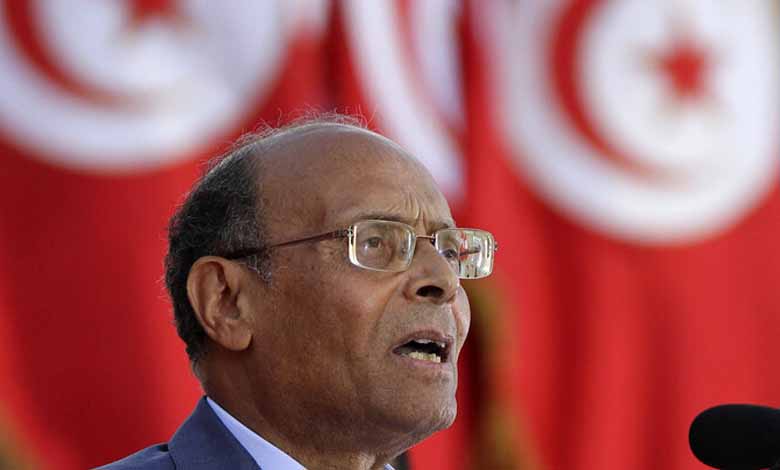Tunisia: Downfall of the Muslim Brotherhood after Marzouki prison sentence

The Muslim Brotherhood in Tunisia is living in a state of terror after the former Tunisian President, Moncef Marzouki, was sentenced to 4 years in prison for inciting chaos inside the country and calling for foreign intervention in Tunisian affairs.
- Tunisian President pulls the rug from under Ennahdha.. What is the relation of Qatar?
- Tunisian President: Is committed to respect the constitution and the independence of the judiciary
Moncef Marzouki was implicated in the charges, following the exceptional measures announced by Tunisian President Kais Saied on July 25th.
According to informed Tunisian sources, Marzouki’s sentence is only the beginning of a long series of legal and judicial proceedings to try prominent members of the Brotherhood organization on charges of inciting national institutions, corrupting political life, obtaining foreign funds, and seizing public funds.
The sources say that dozens of members of the Brotherhood organization are involved in financial and political corruption, in addition to terrorism and the file of political assassinations, in which the secret service of Ennahdha movement is accused.
The sources said that the coming days will witness the opening of new investigations in several cases, in addition to the reopening of old files that were overlooked or passed, because of the Brotherhood’s penetration of judicial institutions and the exertion of pressure on them.
Judicial trials
Hazem El Kassouri, a Tunisian human rights activist, said the coming period will see judicial trials and trials for all those involved in corruption cases, especially Ennahdha. He said the sentence against Marzouki is important because it will deter members of the terrorist organization who are trying to stir chaos in favor of its agenda.
He explained that the acceleration of administrative and legal reforms is at the heart of preparations for the next stage, which includes the application of the law to violations of the 2019 elections, and the exclusion of those involved in this from parties and individuals included in the accounting report; the aim is to establish a new stage for the true democratic process and to prepare effectively for new elections that respect the law and the principle of transparency.
El Kassouri said that the conviction of Moncef Marzouki carries a clear and unequivocal message that the Tunisian judiciary has no authority over it other than the law, a correction to a course in which some of them escaped justice under the pretext of immunities and narrow political calculations, “today there are challenges for the Tunisian judiciary, especially that the country is emerging from a catastrophic health situation as a result of the coronavirus”.
He pointed out that the Tunisian judiciary is in the process of launching a comprehensive judicial investigation on the head of the Ennahdha Movement, Rached Ghannouchi, the leaders Ali Larayedh and Munir El Keski, and all those who are uncovered regarding the circumstances of the leak of 12 thousand tons of explosive materials from the chemical complex (Gabes 2013-2019).
Accusations against Ennahdha leaders
Tunisia’s Muslim Brotherhood Ennahdha faces several charges in court; most prominently, foreign funding was received, some extremist entities were supported, and the judiciary was exploited and the movement was implicated in the liquidation of opponents. Evidence points to the movement as a key factor in the murder of Chokri Belaid and Mohamed Brahmi, according to observers.
On October 6, the Tunisian Court of Accounts issued 350 first instance judgments in electoral cases concerning financial irregularities committed by lists in the 2019 legislative elections, foremost among them Ennahdha.
According to Tunisian political analyst Belhassan al-Yahyaoui, Ennahdha worked for the Brotherhood’s global organization agenda rather than a national agenda, and its literature is completely devoid of the concept of the state and the values of patriotism.
Al-Yahyaoui said that most of the movements of the Muslim Brotherhood’s Ennahdha Movement were in favor of foreign agendas, stressing that working for this organization with its head was in advance of the interests of the country in Tunisia.
The Tunisian researcher confirms that the major crime committed by Ennahdha is what it did regarding Libya, the Arab neighbor, which was hurt because Ennahdha was able to control the state in Tunisia and its presence at the top of the decision-making circles, which made it offer many facilities to the parties that wanted to tamper with the Libyan geography.
He added that Ennahdha had greatly facilitated Turkey’s work in Libya and, during its rule, had facilitated the passage of militants and extremists into Libya through Tunisian territory, as well as the transit of weapons from the Mediterranean basin to Libya.












